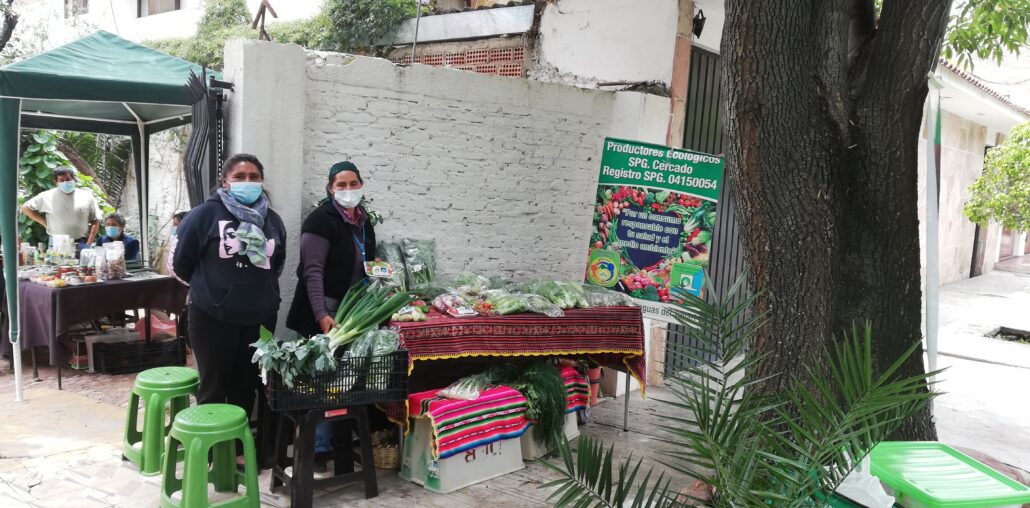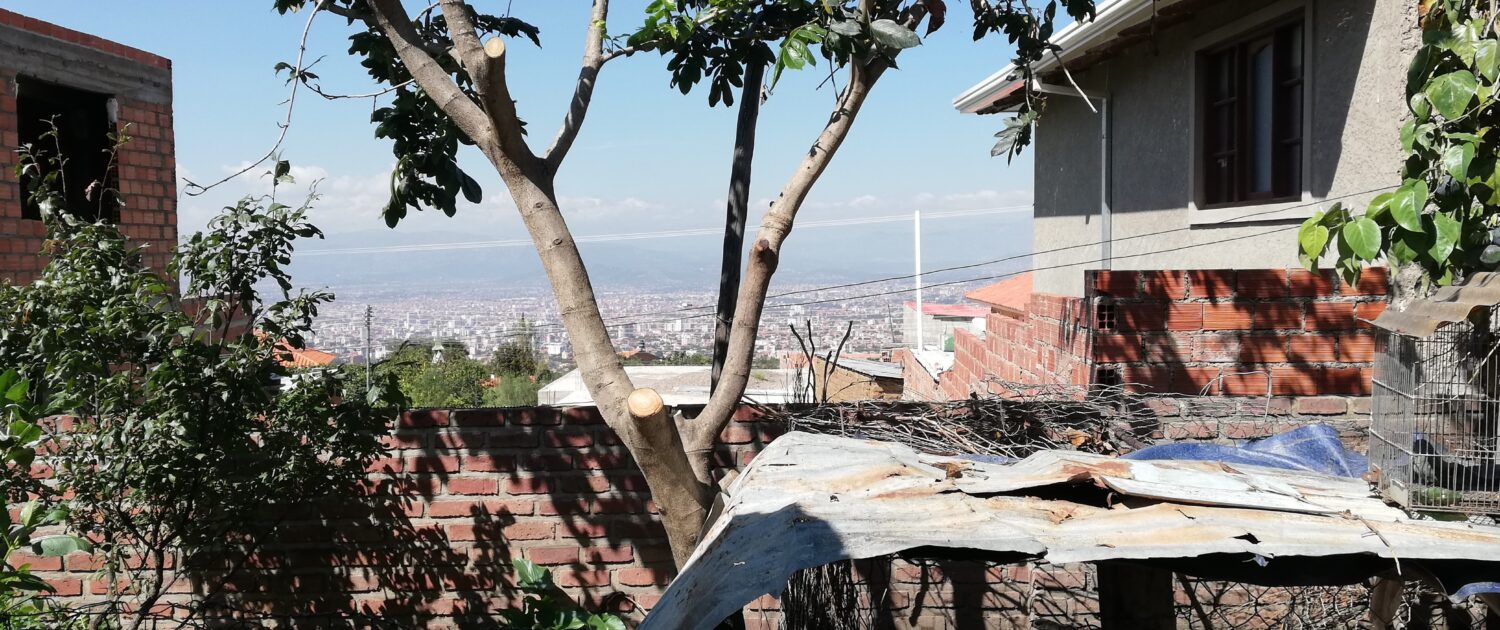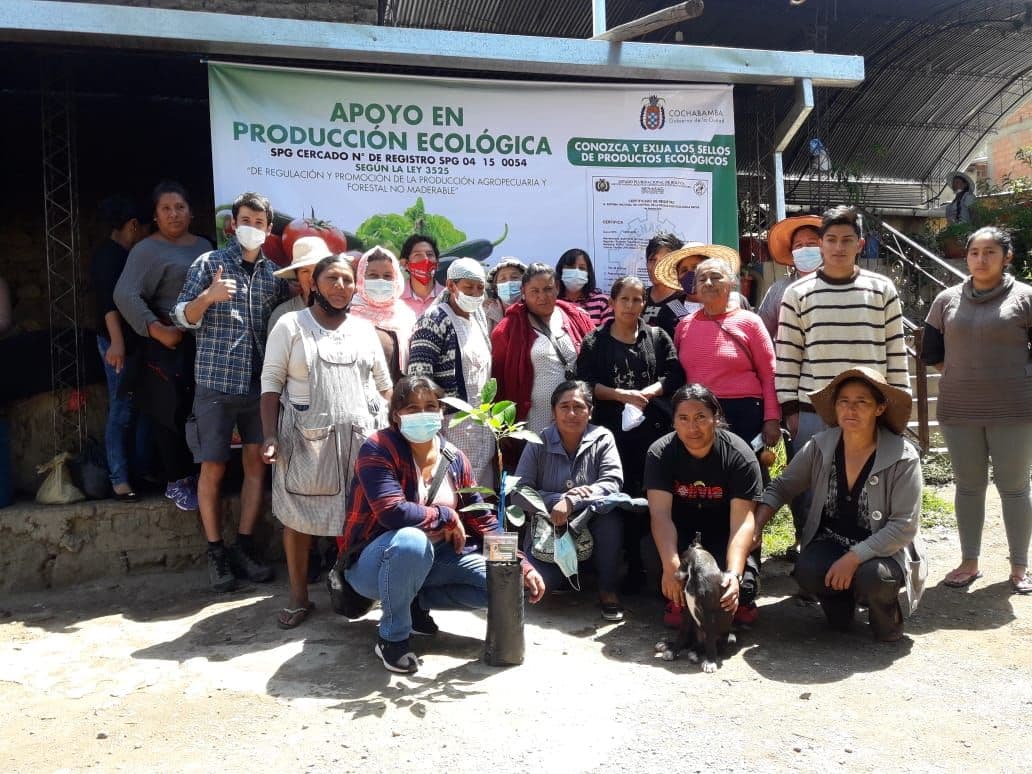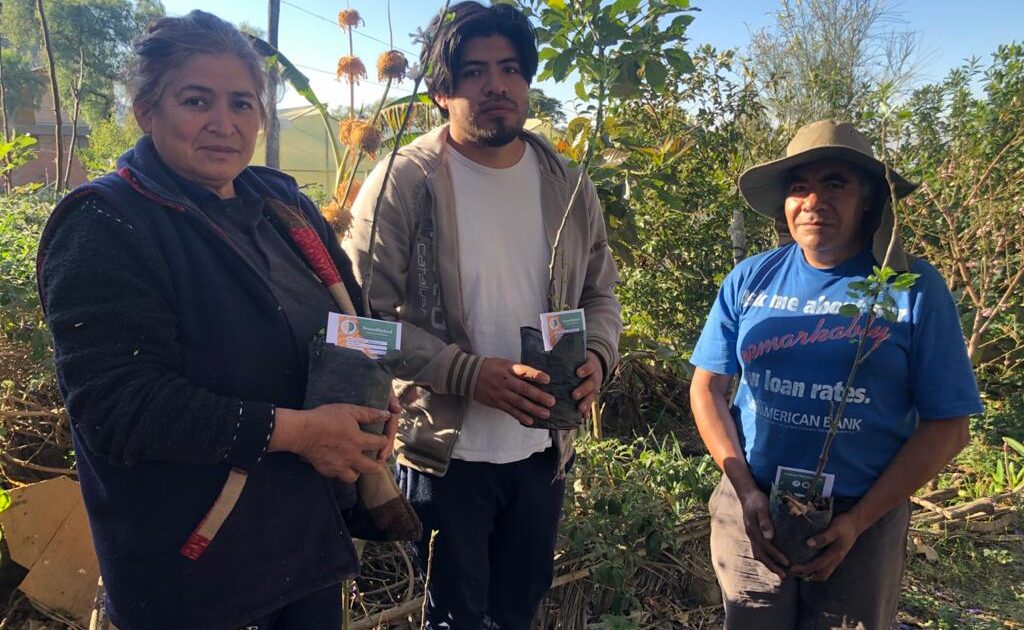April 29, 2022

We at GreenMarked, are committed to delivering good-quality environmental knowledge and know-how. In addition to founding and managing an independent environmental blog, we organize green educational events and outdoor digital detox retreats. However, our list of activities would not be complete without mentioning our tree-planting campaign Agrecol Trees project in Bolivia, which was launched to offset carbon emissions and support Bolivian agroecological producers.
The challenge
Farming is a crucial factor in the overall carbon budget. With emissions ranging between 450 and 500 million tons of CO2 every year [1], European farming accounts for about 10 % of the EU’s total greenhouse gas emissions (2005 dataset). However, at a global level, farming, together with forestry and other land use, accounts for up to 24 % of global greenhouse gas emissions (2010 dataset) [2]. These numbers highlight the importance of increasing the environmental sustainability of this economic sector. Shifting away from high climate-impact agribusiness farming towards more sustainable forms of agriculture, such as modern agroecology, can reduce the environmental impact of global farming.
“Agroecology” is a form of agriculture that applies ecological principles within the farming system so that local ecosystems’ dynamics and enterprise development dynamics are intrinsically integrated. Agroecology is a “more than sustainable” farming type. It is a type of regenerative farming because rather than merely preserving, it aims to increase the environmental, social, and economic capital of future generations, and, in practice, it represents a concrete action to tackle the climate crisis.

Fig. 1: A urban farming parcel overlooking the polluted city of Cochabamba (Author. January 2022).
Taking action
From December 2020, our Agrecol Trees project set up a workflow to donate and deliver agroecological trees to farming communities of Cochabamba (Bolivian Andean region), supervised by our local business partner AGRECOL Andes. Once the carbon trees arrive at the farming community, the community leader distributes them to members who have volunteered to adopt them. They represent the true tree guardian who plant the tree in their parcel and manage it with love and consolidated agroecological practices acquired at AGRECOL Andes workshops. The tree grows healthy, productive, and without synthetic pesticides or fertilizers.
Every tree is co-owned by the donor and the tree guardian. The tree is labelled with an identity card specifying the order and donation number, species, location, and the guardian/caretaker’s name. Every tree is finally geolocated and photographed, and photos and details are sent to the donor to monitor its growth throughout the year until the first fruits appear.
We specifically selected three fruit species for this project because of their environmental, social, and commercial benefits: the cherimoya tree (Annona cherimola), the avocado tree (Persea Americana) and four cultivars of lemon tree (Citrus limon, Citrus aurantiifolia, Citrus × latifolia and Citrus × limonia).
Cherimoyas are one of the native fruit trees in the Bolivian Andes. Well known for their delicious fruit, cherimoya trees are relatively small (5 to 10 metres) but have a significant air carbon sequestration capability thanks to their high foliage density.
Although avocado trees are from tropical and subtropical regions of Bolivia, they are highly adaptable and can grow in Cochabamba (up to 2600 m a.s.l.) thanks to natural and intentional adaptations. Growing up to 20 metres, these leafy and evergreen trees can capture considerable amounts of CO2. Their seeds are used as a treatment for headaches in local traditional medicine, and the commercial value of their fruits makes them a significant source of income for local farmers.
Lemon trees are not endemic to Bolivia but grow fabulously in many farming parcels, gardens, and street corners of Cochabamba. They are evergreen, require minimal pest-control treatments and provide fruit throughout the year, making them an attractive solution in agroecology, carbon sequestration and farming business.
Solutions: outcomes and learnings
Since the beginning of the project, our Bolivian social tree-planting activity successfully planted 111 agroecological trees in seven sites in the metropolitan area of Cochabamba. Through seven orders (six in 2021 and one in 2022), the trees were delivered to three certified agroecological farming communities, two schools (a secondary school and a primary school for kids with disabilities) and an Alzheimer’s care centre and retirement home. Although its environmental impact is small, the social impact of the Agrecol Trees project, considering its micro-funding, is immense. Involving 111 Bolivian tree guardians and 68 European donors, the strength of our project lies in the people. Local smallholders, students and teachers, elderly and care centre workers, friends, environmentalists, and environmental supporters chose to share a tree-ownership to sustain Bolivian agroecology and the global fight against the climate crisis.

Fig. 2: The “Cercado” certified agroecological farming community at the Agrecol Trees project kick-off meeting in Cochabamba (Author. January 2021).
The voice of a climate crisis fighter
Nelly is one of the certified agroecological producers of Cochabamba that joined our Agrecol Trees project. As a leader of the farming community “Cercado”, Nelly coordinated the distribution of 50 plants to the community members of the two city districts of Taquiña and Tirani. On a typical Saturday ecological fair in Cochabamba’s city centre – where certified farming communities can sell and promote their unambiguously marked agroecological products – we interviewed Nelly about agroecology in Cochabamba, the challenges behind it and the story of how she became an agroecological farmer.
You understand things when you fall and when you get sick. I used to grow flowers in the Tunari Park and sell them at the city markets. I would fumigate my fields with insecticides and fungicides and contaminate the Park, which represents the lungs and water reserve of Cochabamba. I was only concerned about selling my flowers and gaining enough money. After I fell, my health and the health of my family and my children became my first and uttermost concern.
Health and family protection are perhaps the strongest motherly feelings. Unsurprisingly, most of the “Cercado” community members are women with a story similar to the one of Nelly. Either they got sick, or their children did from eating dishes full of chemicals and inhaling pesticides used in the flower farming activities. That is when they and their families switched from treated flowers to healthy vegetables. Besides four newcomers, all the other men in the group are their sons. As mothers, they were able to pass on the importance of agroecology and agroecological knowledge and know-how to their future generations.
“We left them a heritage” declared Nelly.
Three years ago, Nelly decided to switch from flower growing to agroecological farming, thus beginning the procedure of becoming an official Bolivian agroecological farmer. This involves going through the bureaucratic steps of the national Participatory Guarantee Systems (“PGS”) certification: a “locally focused quality assurance system [that] certifies producers based on active participation of stakeholders” [3]. A PGS certification is built on trust, transparency, social network, and knowledge exchange, which altogether reduce certification costs and time [4]. With the support of AGRECOL Andes, Nelly embarked on the three-year conventional-to-agroecological farming conversion and PGS certification process and began creating a future-proof form of agriculture together with other former flower growers.
In 20-30 years, I will not be around, but my children and food products will still be. As women, our job is to keep our loved ones healthy; as producers, our job is to produce in a way that our children can eat healthy food and breath uncontaminated air. We must think and farm with the future on our mind… and prevent that urban sprawling takes away all the green and farming spaces.

Fig. 3: Nelly (leftside) and members of the “Cercado” certified farming community at the ecological fair in Cochabamba’s city center (Author. February 2022).
While strongly upholding the ideal of healthy future-proof farming and loyally following the mission and requirements of agroecology, Nelly admits that agroecological production remains a niche in Cochabamba and Bolivia.
We are still a long way from having a real social and environmental impact in the city. Our dream is to promote ecological fairs and disseminate agroecological products in the city. We would like the citizens of Cochabamba to know more about agroecology, that there is an ecological fair in their city, and about us. People of the city, the region and the whole country must be able to recognize agroecological products from the official agroecological symbol and must know that we, agroecological producers, use only natural fertilizers and plant protection products on our fields, and avoid any type of chemical treatment. It is frustrating to carry all the burden of respecting agroecological standards, and nobody knows about it. There is still a lot to do to promote our work and increase the public conversation about agroecology.
And what about those that do know about the labor and values behind agroecology? Are they willing to pay more for healthier and more environmental – and climate-friendly products?
In truth, many of our products are sold at about the same price as the conventional ones. When they are slightly more expensive, it is because we also value the increased complexity of agroecological production. Firstly, agroecological production implies satisfying all of the considerable requirements set by the National Service of Agricultural Health and Food Safety (SENASAG), the city administration and the ecological evaluation committee. Secondly, our crops are vulnerable to many plant diseases, which means sometimes we have to discard our entire harvest because we cannot take certain preventative measures that conventional agriculture uses. It is rather upsetting to see a plant disease hitting your field and hampering your production. As a countermeasure, we decided to diversify our products and incorporate poultry farming. When our vegetables are adversely affected, we can still rely on our chickens and ducks.
To tackle all these challenges, agroecological producers need administrative help to deal with the bureaucracy, agronomical expertise to eradicate diseases naturally and public promotion to boost a little-known farming method. While joyfully praising the excellent help offered by the AGRECOL Andes Foundation, Nelly denounces the lack of meaningful support from local public authorities.
We need a lot more help from the authorities to achieve significant results. Most people in the city do not care about agroecology. They live one day to the next. They do not think of human health, the climate, and the natural environment. The city administration should help us spread the word of agroecology and help us create a secure space dedicated to agroecology in local markets. We would be much more encouraged if we had one. But we are still a long way from having one.
Nelly’s views on our Agrecol Trees project are very different.
Receiving a tree as a gift is a blessing. Never in our life has somebody gifted us a fruit tree. You plant it, and you will see and collect its fruits in two or three years. And you are adding oxygen to the local atmosphere.

Fig. 4: Three tree guardians of the “Cercado” agroecological farming community in the district of Taquiña – Cochabamba. (GreenMarked & Fundación Agrecol Andes, May 2021).
As one of our main project contributors, we highly appreciate Nelly’s words. We attach great value to her analyses to provide concrete support to Bolivian agroecology, Cochabamba’s agroecological producers and the global climate crisis fight. As Nelly highlights, this project does not only affect the people and environment of today but also of tomorrow.
We receive a lemon tree, plant, cultivate it and we sell its fruits to the market in two-three years. Our kids look at us, and they also want to do it! They also want to receive a tree as a gift and take care of it. With this project, we are showing them agroecology and transmitting agroecological values to the future generation.
Listen to the original interview in Spanish
Cover photo: An “untidy” and highly diverse farming parcel in the backyard of a “Cercado” community member (Author. January 2022).
Preview photo: Nelly (leftside) and members of the “Cercado” certified farming community at the ecological fair in Cochabamba’s city center (Author. February 2022).


